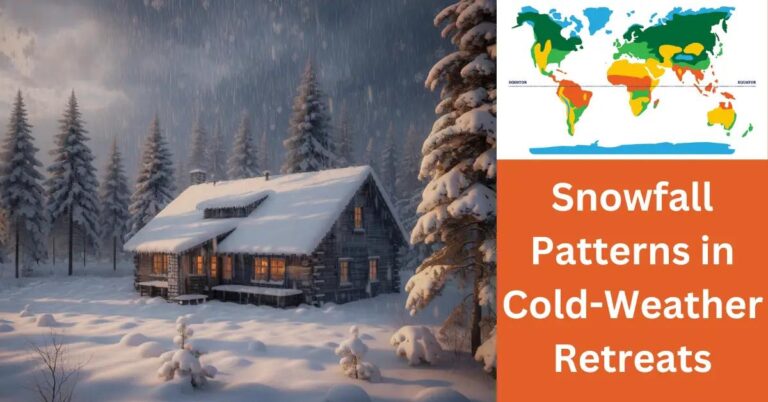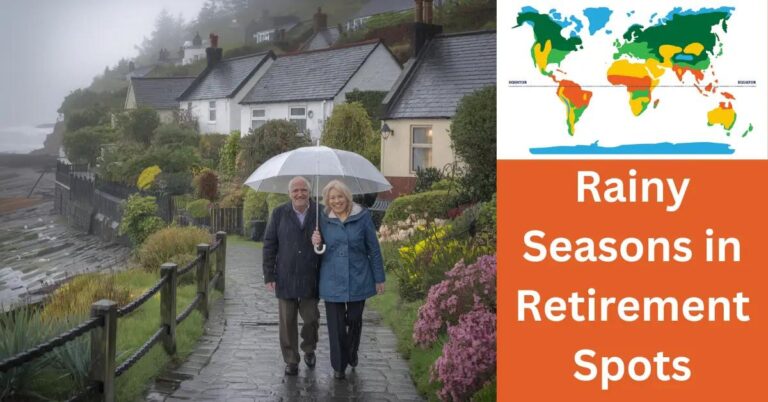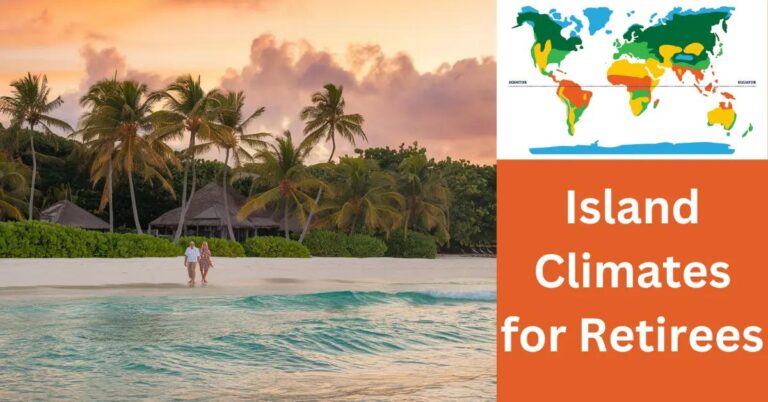TL;DR:
- Monsoon seasons impact retirement planning with travel difficulties, health risks, and increased expenses.
- Flexible living arrangements and robust housing are crucial for seasonal adaptability.
- Prepare emergency funds and insurance to cover potential monsoon-related costs.
- Consider regions with strong infrastructure suited for monsoon challenges.
- Evaluate senior living options with a focus on building safety and flood risks.
- Travel during monsoons can be economical but requires careful planning and flexible itineraries.
- Retirees should use travel insurance and consider guided tours for safer journeys.
- Health risks include waterborne diseases and mosquito-borne illnesses; maintaining wellness and having a healthcare plan is essential.
- Choose retirement locations that offer adequate amenities and connectivity during adverse weather.
Preparing for retirement comes with its own set of challenges, but have you considered the role of monsoon seasons in your planning? As an expat, you must navigate these seasonal shifts, and understand how they can impact your lifestyle and financial strategies. From adapting living arrangements to managing travel and health considerations, monsoons weave into every facet of expat retirement. Let's dive into practical tips and explore how to tailor your retirement plans for the monsoon climate.
What are the Potential Impacts of Monsoon Seasons on Retirement Planning?
Monsoon weather can greatly influence retirement choices. The changes in weather affect daily life, travel, and logistics. In retirement, you want a lifestyle that suits your comfort and needs.
Monsoon season impacts on retirement planning can be vast. Roads flood, making travel hard. Health services might get delayed. These factors influence where and how you choose to retire.
You might want flexible living arrangements for such seasonal changes. Consider homes that are strong against heavy rains. Plan for potential weather disruptions. It's wise to prepare for monsoon conditions.
Adapt your financial plans to account for these climate changes. Expenses might rise in monsoon seasons. Plan for unforeseen costs, such as property damage or health emergencies.
Retirement strategies for seasonal climates should include flexible plans. Consider splitting time between different places. Spend monsoons in drier areas, if possible.
It's important to incorporate climate considerations into retirement planning. Weather affects health, activities, and finances. You need plans that cover climate impacts on living conditions.
You may ask, “What strategies can help mitigate monsoon-related risks in retirement planning?” Consider preparing a robust emergency fund. This fund helps cover expenses during unforeseen weather events.
Evaluate your insurance needs. Ensure your health and home are protected against monsoon damage. Research insurance options available in monsoon-prone areas.
Look into communities designed for weather adaptation. Retirement communities may come with added benefits for monsoon resilience. Some have built-in features to handle severe weather conditions.
When deciding where to retire, think about the monsoon season impact on retirement planning. Choose locations with good infrastructure for weather disruptions. Consider transport, healthcare, and daily needs.
By understanding how monsoons affect retirement, you can make informed decisions. Planning ahead prevents stress and surprises. Choose strategies that align your retirement vision with climate realities.
How can retirees budget effectively for travel during monsoon seasons?
Traveling during the monsoon can be tricky but rewarding. What are the best budgeting strategies for travel during monsoon? It's essential to plan your travel around the rain. Search for places known for their beauty during this time. Some destinations offer lower rates because it's off-season. This means you can enjoy savings on flights and hotels.
Talk to agents about packages. They might have exclusive deals for retirees. Keeping your travel flexible can help. Wait for forecasts before booking. Adjust your plans according to the weather to avoid surprise expenses. Planning your budget carefully can ensure a joyful trip regardless of rain.
Now, how can retirees ensure safe travel during monsoon seasons? Safety starts with preparation. Pack light and choose waterproof gear. Carry plastic bags to keep valuable items dry. Always bring a small medical kit. Include medicines, band-aids, and a flashlight in your travel bag, too.
Look for travel insurance policies covering weather issues. Wet roads make driving dangerous, so consider guided tours. Tour operators often know safe routes. If using public transport, check schedules. Heavy rain can cause delays or cancellations. Know alternate routes to avoid getting stuck.
Listen to weather reports and local advice when out exploring. Stay indoors during severe storms. In flooded areas, watch your step and avoid stepping into unknown waters. Sometimes it's better to wait until the roads clear, especially on heavy rain days.
Exploring affordable travel options for retirees in monsoon zones is possible. Just remember, safety first and flexibility. Consider these tips and enjoy your travel without a hitch.
For more practical advice on safe travel during the rainy season, read additional travel safety tips for retirees during rainy seasons.
What Health Considerations Should Retirees Take During Monsoon Seasons?
Monsoon seasons can bring special health risks for retirees. The biggest issues include waterborne diseases like cholera and stomach infections. This happens because floods and heavy rain can spoil clean water sources. You must plan for these health risks in changing climates.
One important first step is to drink only filtered or bottled water. This reduces the chance of getting sick from unsafe water. Mosquitoes love the rain, bringing more diseases like dengue fever and malaria. To protect yourself, use mosquito nets and wear long sleeves.
Health care planning is super vital during monsoons. Keep medicines dry and safe by using waterproof boxes. You should also have extra medicines at home. Clinics and hospitals might be harder to reach during heavy rains.
Maintaining wellness in rainy, humid conditions means staying dry and warm. Wet clothes can give you skin infections or a cold. Always keep extra clothes and a towel in your bag. Eat warm foods and soups to keep your body strong.
For accessing healthcare services during monsoon, know where the nearest clinics are. Check if they are open during heavy rain. Keep emergency contact numbers handy. This includes local doctors or community health workers.
Also, plan your insurance with attention to monsoon challenges. Some policies cover diseases more common in rainy seasons. Ensure your insurance can cover both local and emergency treatment needs.
By thinking ahead, you can enjoy rain without health worries. Make these simple changes to live healthier during the season. These actions keep you engaged and active during a lovely, yet tricky, time. Your health is important, so take these steps seriously.
How Should Retirees Choose and Evaluate Senior Living Options in Monsoon Regions?
When choosing where to live in monsoon zones, retirees should think about safety and comfort. The first question is: What should retirees consider when selecting living arrangements in monsoon areas? Precision requires examining building safety, flood risk, and local weather patterns. You need to know if the place has strong roofs and flood drains because this keeps your belongings safe.
Monsoons bring heavy rain and humidity. You must ask: How can retirees assess climate suitability for potential retirement destinations? Precision tells you to visit during different seasons. Test how well you manage daily activities, like shopping, when it's rainy. If you like to stay indoors more during rains, check if the community has indoor activities and clubs. This way, you can stay busy and meet friends even when it pours outside.
It’s smart to look into the area’s infrastructure and amenities. Ensure they can face storms. For example, see if roads flood easily or if stores close during rainy months. Some places have generators and backup systems that keep power and water available. These features make life easier during storms.
Retirement communities can be beneficial as they often plan for bad weather. They may have strong buildings and other climate adaptation measures. Look for places that offer special care, like health services or emergency plans, during storms. A community like this not only protects but also offers peace of mind. Being in a place prepared for monsoons helps you enjoy retirement without worrying about unexpected weather.
Conclusion
Monsoon seasons can deeply affect retirement plans. They impact lifestyle, challenge logistics, and demand flexible solutions. To mitigate risks, adapt your financial plans and living arrangements. Watch your health and budget wisely if you plan to travel. Choose senior living options that fit well with local climate considerations. By staying informed and prepared, you can enjoy retirement even in unpredictable weather. Focus on the positives; flexibility and planning can ensure your comfort and well-being all year round.












